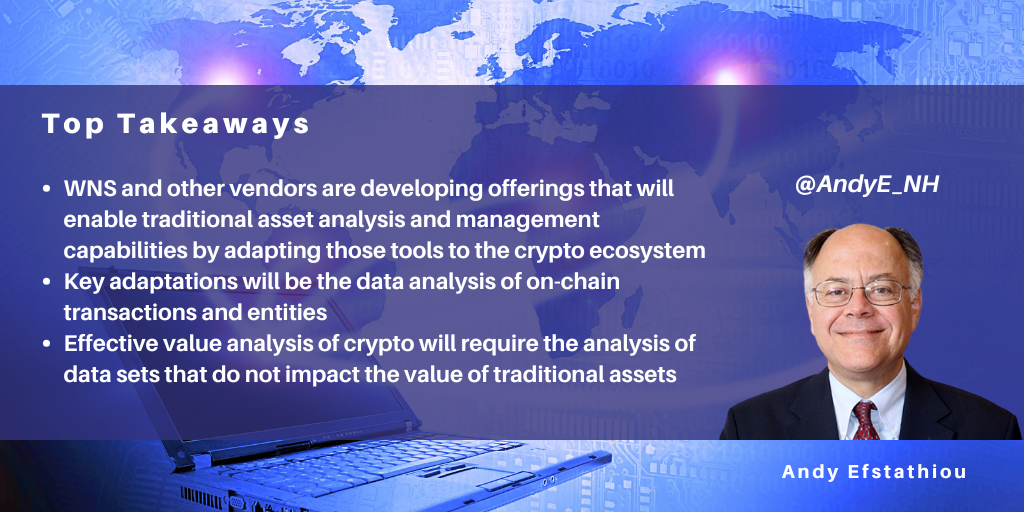Search posts by keywords:
Filter posts by author:
Related Reports
Related NEAT Reports
Other blog posts
posted on Apr 11, 2025 by Andy Efstathiou

In recent years, cryptocurrency (crypto), a digital currency that relies on a distributed ledger system to maintain ownership and transaction records, has emerged as a new asset class. Crypto has experienced the ups and downs typical of emerging technologies. In 2022, the demand for crypto hit a low, with the value of bitcoin dropping by over 74% from $64.4k on November 13, 2021, to $16.5k on December 31, 2022. Since then, Bitcoin has risen to $87.4k, a 430% increase.
The new Trump administration has accelerated the adoption of crypto, and President Trump has pledged to make the U.S. the crypto capital of the world. This is the first in a series of blogs on crypto that will focus on how financial institutions and technology services vendors are addressing the market opportunity and what best practices look like today. First, I will take a look at WNS’ initiatives.
The crypto challenge
There are four main types of crypto: payment (e.g., Ethereum, Bitcoin), Tokens (e.g., Ethereum), Stablecoins (e.g., Tether), and central bank digital currencies (e.g., digital yuan or e-CNY).
Each type of crypto has a different set of stakeholders, regulations, and technology architecture. Successful operations in each major crypto type require discovery, policy deployment, technology infrastructure, and business model build-out to enable successful, secure operations.
Regulations on crypto are beginning to emerge and vary widely by country. The organization with the most mature regulatory approach to crypto is the Financial Action Task Force (FATF), an intergovernmental organization set up by the G7. The EU has adopted the FATF’s approach to regulation in their MiCA regulation. Adoption of crypto by people and businesses remains low due to a perceived lack of security, which has been amplified by many examples of bad actors stealing or laundering crypto. However, the strength of crypto, which has no centralized manager or single source of failure, is also its primary challenge. The decentralized nature of crypto enables bad actors to game the system and commit various financial crimes.
So, what are the best practices for participating in a crypto environment?
The WNS approach
WNS provides a set of compliance services for financial institutions looking to operate in the crypto world. There are four service offerings:
- KYC: performing new customer onboarding and continuous monitoring (periodic reviews, perpetual KYC) of customers in establishing customer identity, understanding their background and activity, and identifying any potential risks, all to ensure compliance with regulations
- AML: performing AML investigations for crypto transactions by verifying trigger alerts, searching the customer for payments related to crypto, performing a KYC profile, and analyzing the on-chain flow of funds for red flags, if any, to report to regulators
- Fraud investigations: supporting client fraud investigation with triggers to protect customer funds/assets
- Customer query handling: replying to customer inquiries on crypto, verifying onboarding documents, requesting additional documents, and requesting clarification.
To enable the delivery of these services, WNS provides its employees with training specific to crypto-based security issues. Recently, it launched a Compliance-in-a-box service to support KYC, AML, Fraud, and SAR form preparation for suspicious customers. The Compliance-in-a-box solution targets Fintech firms that do not have the resources to deliver these services internally for the foreseeable future.
WNS is also building new services for crypto clients, including:
- Advanced Financial Crime Compliance (FCC) services: currently, all FCC vendors can analyze data from public sources (e.g., internet, media, and data vendors). Few crypto participants can analyze on-chain data for a Financial Crime assessment. The few institutions able to analyze on-chain data are global institutions that use the data for proprietary purposes. WNS will explore developing on-chain analytics solutions and integrate them with public blockchain data to provide FCC services customized for crypto assets
- Intelligent Customer Service driven by GenAI capabilities: providing high customer experience to end customers with faster onboarding and self-service capabilities through AI/ML-driven transformation/analytics solutions.
In summary, WNS and other vendors are developing offerings that will enable traditional asset analysis and management capabilities by adapting those tools to the crypto ecosystem. Key adaptations will be the data analysis of on-chain transactions and entities. Effective value analysis of crypto will require the analysis of data sets that do not impact the value of traditional assets.
